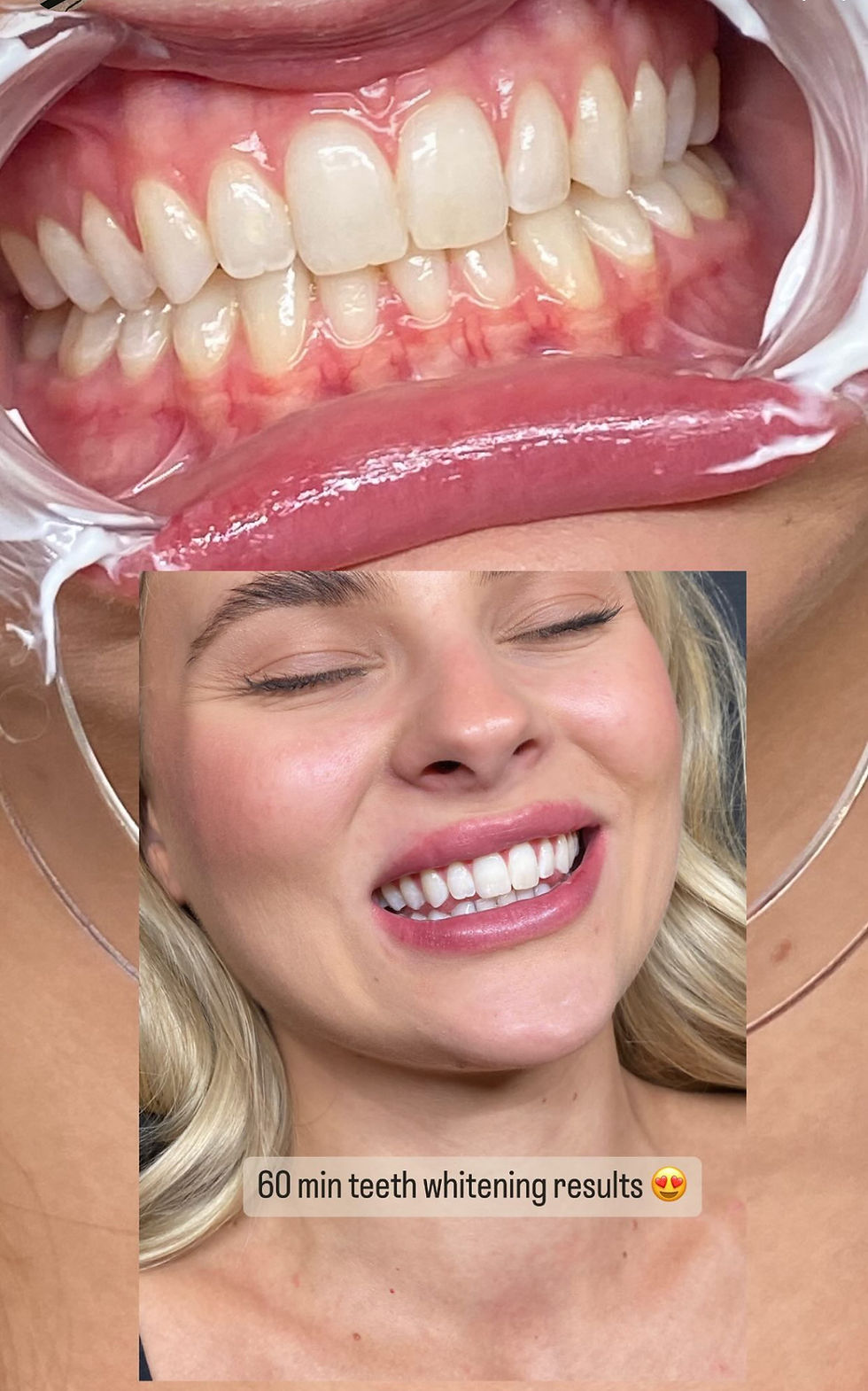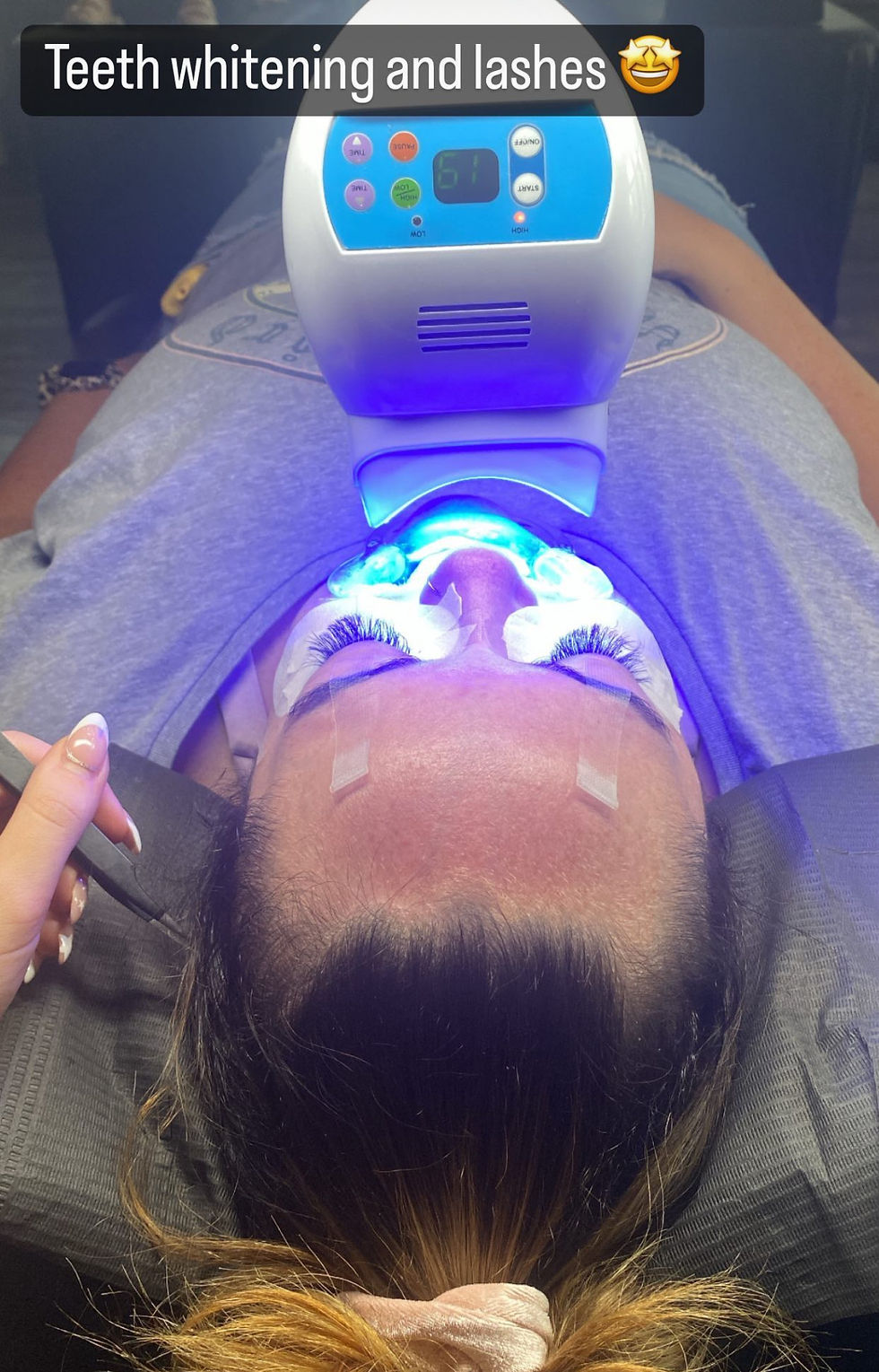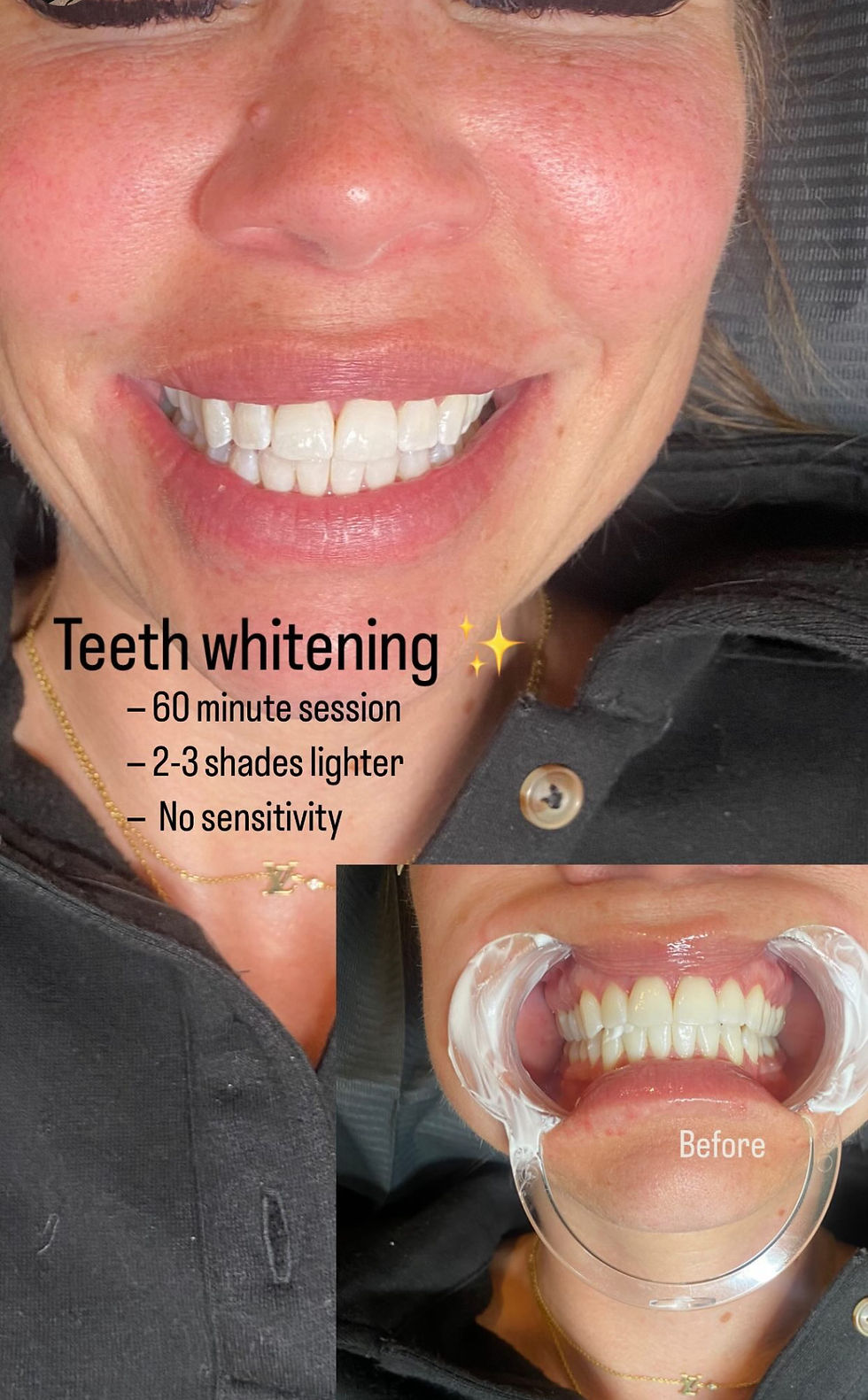Teeth Whitening





What is the recommended treatment time for professional teeth whitening?
We offer a 30 minute and a 60 minute treatment time appointment option. The amount of time recommended will dependon a few factors for every individual:
30 Minutes:
-
You never had your teeth whitened done professionally before and unsure if it's for you
-
You have sensitive teeth and / or gums
-
You already have white teeth and you're looking for surface stain lifting
-
You're in a hurry and you're wanting your teeth whitened on your lunch break
60 Minutes:
-
You have had your teeth whitened professionally before and you did not experience sensitivity
-
You have not had your teeth whitened professionally before and you know that your teeth and / or gums are not generally sensitive
-
You have deep discoloration due to drinking coffee, other dark beverages, smoking, etc.
-
You want the best possible result in one session
How long will my teeth whitening results last?
As with most aesthetic services the results from your teeth whitening treatment(s) can last anywhere from 6 months to 1 year depending on your diet, habits, oral hygiene, and genetics. We recommend coming back at least twice per year to maintain your results.
Will professional teeth whitening cause sensitivity?
Although not every person will experience sensitivity during and / or after teeth whitening, sensitivity to the teeth and gums can be common especially if you already experience general sensitivity when hot and cold temperature food and beverages come in contact with your teeth and gums.
We recommend using a colorless Fluoride toothpaste after your service as Fluoride will help to minimize sensitivity. You can also take an over the counter pain reliever if needed. Sensitivity after a teeth whitening service should subside in 24-48 hours.
What products do you use for professional teeth whitening?
We use a whitening agent called Carbamide Peroxide. Carbamide Peroxide contains hydrogen peroxide in a 1:3 ratio. This means that a 30% carbamide solution has only 10% hydrogen peroxide. A study conducted by the American Dental Association found that initially, patients using carbamide peroxide had a more significant change in whitening compared to Hydrogen Peroxide.
We will give you a disposable cheek retractor that will help to keep lips away from your teeth and a professional dental grade LED blue whitening light is used to activate the Carbamide Peroxide to break down stains on the enamel. The LED light can emit warmth; therefore, the gums are protected with a layer of Vitamin E.
Who is NOT a good candidate for professional teeth whitening?
Here are some reasons why certain individuals may not be suitable candidates:
-
Pregnant and nursing women: The potential effects of teeth whitening chemicals on a developing baby are not well-studied, so it's generally recommended to avoid treatment during pregnancy and breastfeeding. Hormonal changes during pregnancy can also make gums more sensitive and prone to irritation, potentially worsening discomfort from whitening agents.
-
Children and teens under 16: The pulp chamber in young teeth is larger, and whitening treatments could cause irritation and damage to developing enamel.
-
People with sensitive teeth: Whitening treatments, especially those with stronger bleaching agents, can worsen tooth sensitivity and cause discomfort.
-
Individuals with gum disease, tooth decay, or other oral health issues: Untreated dental problems can be exacerbated by whitening treatments, leading to increased sensitivity, pain, and potential damage to teeth and gums. It's crucial to address these issues before considering whitening.
-
Those with dental restorations: Crowns, veneers, and fillings will not whiten along with natural teeth, potentially leading to an uneven appearance.
-
People with intrinsic stains: Stains caused by trauma, certain medications, or fluorosis, which are deep within the tooth, may not respond well to traditional bleaching methods. Alternative cosmetic options like dental bonding or veneers may be more suitable in these cases.
-
Individuals with allergies to whitening agents: Some people may be allergic to ingredients found in whitening products, such as peroxide. Allergic reactions can include redness, swelling, burning, or blistering of the lips and gums.
-
Individuals that have NOT had an annual dental exam and cleaning by their dentist in 12+ months
It is always best to discuss your individual circumstances and oral health with your dentist before embarking on any teeth whitening treatment, as they can assess your suitability and recommend the safest and most effective options for you.
How do I prepare for my professional teeth whitening service?
You should prep your teeth by keeping up with good dental hygiene before your appointment. On the day of your appointment, gently brush your teeth and try to avoid irritating your gums. Also, stick to drinking water and eating non-acidic foods, so your teeth will be ready for the whitening solution.
For at least the first 48 hours, it’s best to avoid darkly colored foods and drinks, including berries, coffee, tea, red wine, and tomato sauce.
Additionally, you’ll want to avoid highly acidic foods, like fermented fruits and vegetables or anything put in vinegar, and you’ll want to skip eating citrus fruits.
It’s important to note that while the pores in your teeth should be back to their normal size after 48 hours, you can extend your caution for a full week in order to ensure that your teeth whitening procedure achieves the best possible results.
Some foods and drink you can safely consume include:
Bananas
Broccoli
Cauliflower
Celery
Chicken
Clear alcoholic beverages, like gin, sake, white rum, vodka, white wine and light beer.
Cucumbers
Fish
Lightly colored herbal teas, including white tea, decaffeinated tea, green tea, herbal infusions and rooibos tea
Milk or a milk alternative, like soy or oat milk
Pasta and rice
Pears
Plain or vanilla yogurt
Quinoa
Turkey
Water and clear juices
Foods you should avoid directly after getting your teeth whitened include:
Balsamic vinegar, or any vinegar because it is acidic
Barbecue sauce
Beets
Berries
Carmel colored sodas
Chocolate
Citrus fruits and juices
Coffee
Darkly colored tea, including black tea, chai tea, fruit tea and some herbal teas
Red wine
Soy sauce
Spicy foods that may further irritate gums and teeth
Tomatoes and tomato-based products
Turmeric
